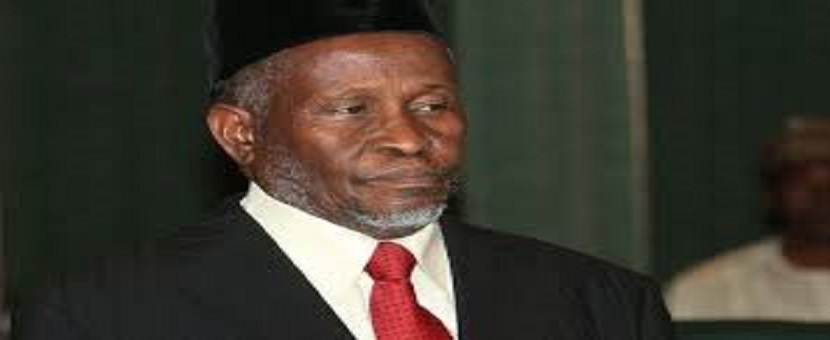How I. T. Muhammad CJN (Rtd) emerged as CJN
In 2019, the Federal Government of Nigeria preferred Charge No. CCT/ABJ/01/19 against the former Chief Justice of Nigeria (CJN), Honourable Justice Walter Samuel Nkanu Onnoghen (CJN) for offences bordering on breach of code of conduct for public officers – non-disclosure of assets – at the Code of Conduct Tribunal (CCT). At the time, relying on an unprecedented ex parte Order of the CCT, the President of the Federal Republic of Nigeria, Muhammadu Buhari, illegally suspended Hon. Justice Onnoghen as the CJN. Subsequently, the ex-CJN reportedly resigned following the recommendation of the National Judicial Council (NJC) for his compulsory retirement.
Cross River State challenged the exit of Hon. Justice Onnoghen CJN at the Supreme Court on grounds of constitutional breaches but the matter met an abrupt unsuccessful end.
On 17th of July 2019, the Senate confirmed the appointment of Hon. Justice Ibrahim Tanko Muhammad, JSC (as he then was) by the President as the CJN based on the recommendation of the NJC.
Sudden resignation
On 27 June 2022, Hon. Justice I. T. Muhammad CJN (Rtd) reportedly resigned as the CJN. The sudden news of his resignation was allegedly based on health grounds. Hon. Justice Olukayode Ariwoola, JSC (as he then was) was immediately sworn in as CJN but in acting capacity.
Why the sudden jubilation?
The sudden resignation of Hon. Justice I. T. Muhammad CJN (Rtd) was greeted by a sudden jubilation across the country including the legal community. Many saw it as a welcome development. The reasons are not far-fetched.
Hon. Justice I. T. Muhammad CJN (Rtd) was seen as a betrayer of the former CJN, Hon. Justice Onnoghen CJN (Rtd). Prior to the unceremonious retirement of Hon. Justice Onnoghen, Hon. Justice Muhammad was aware of a similar incident in Abia State and how the NJC treated the matter in 2018. The NJC had recommended the compulsory retirement of Hon. Justice Obisike Orji for allowing himself to be sworn in, following his illegal appointment by Governor Okezie Ikpeazu as Acting Chief Judge of the State. Hon. Justice Orji was appointed to take over from Hon. Justice Theresa Uzokwe who was unconstitutionally suspended as Chief Judge by the Governor based on the recommendation of the State House of Assembly on grounds of judicial misconduct but without referring the matter to the NJC for action. More so, Hon. Justice Orji was not recommended by the NJC for appointment.
Hon. Justice Muhammad was said to be a critical member of the NJC that dealt with the case. The NJC subsequently considered the allegations and recommended the compulsory retirement of Hon. Justice Uzokwe.
Furthermore, during the Senate session where Hon. Justice Muhammad was eventually confirmed as CJN, his Lordship misfired a question put to him on the floor of the Senate which touches on technicality in the administration of justice. Not only that his Lordship, respectfully, went off-track with his answer, a couple of grammatical errors seemed to have rendered his outing not too impressive.
Doubting his competence, some were of the view that a more competent Jurist ought to have been appointed especially when the idea of appointing the most senior of the Justices of the Supreme Court as the CJN is merely conventional and not a constitutional requirement.
Meanwhile, this development at the time did not entirely do away with the fact that the Learned Justice has many outstanding judgments to his credit in the Supreme Court such as the case of Shalla v. State [2007] 18 NWLR (Pt.1066) 240 S.C. where the Learned Justice condemned the extra-judicial killing of any person on grounds of blasphemy. In Darlington Eze v. Federal Republic of Nigeria, Hon. Justice Muhammad held that a counsel whose fees have not been settled can lawfully refuse service of a process on him.
The main trouble
It however appears that the main issue which heralded the exit of Hon. Justice Muhammad was the unprecedented explosive memo by other Justices of the Supreme Court which leveled strong allegations against the ex-CJN for his Lordship’s alleged disregard for the welfare of Justices of the Supreme Court during his tenure. Before his exit, the ex-CJN had responded to the letter stating ongoing efforts but also noting that “the Supreme Court definitely does not exist outside its environment, it is also affected by the economic and socio-political climate prevailing in the country.”
Conclusion
It is believed that the current Acting CJN will reposition the judiciary on the path of dignity and excellence. In the words of the President of the Nigerian Bar Association, Mr. Olumide Akpata:
There is now more than ever the need for urgent reforms in the judiciary and to rebuild the almost dissipated confidence that Nigerians have in the judiciary and the wider legal profession in Nigeria.














